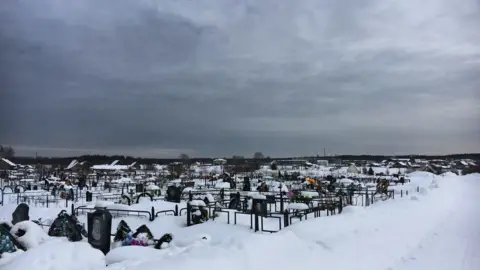The Russian guns for hire dying in Syria
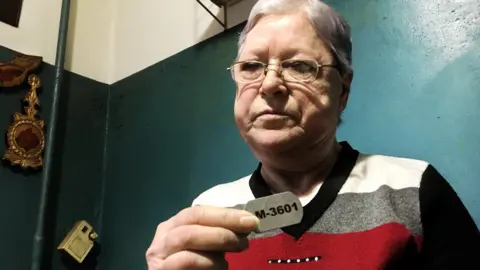 BBC
BBCThe deaths of Russian fighters in Syria on 7 February exposed the operations of a shadowy group of mercenaries there. Some reports speak of more than 100 Russians killed in one battle; officially it is "several dozen" Russians killed or wounded.
The BBC Russian Service has investigated how and where Russian guns for hire have been killed in Syria.
Last September, Nina Atyusheva, a pensioner in the small town of Severoonezhsk, received a phone call telling her that her son Yevgeny Alikov had died in Syria.
A week later a man arrived with a coffin and 5m roubles (£63,050; $90,000) in insurance money. He had driven 2,100km (1,305 miles) to Russia's far north to return Nina's "little boy".
The man placed the money on the kitchen table in stacks of 5,000-rouble notes.
The BBC attempted to contact the man, but whoever answered the phone claimed to be someone else and said he knew nothing about Russian volunteers in Syria.
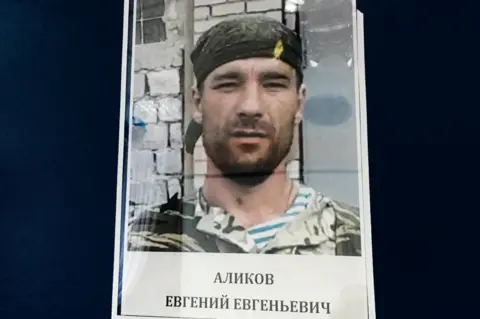
'Mum, I'm off to the front'
There is not much to Severoonezhsk in the Arkhangelsk region. It's a remote mining town where the only landmarks are the five-storey apartment blocks by the River Onega.
Yevgeny studied in St Petersburg and, after getting married, moved to Moscow to live with his wife and three children.
Nina says that between 2014 and when he left for Syria, her son went to eastern Ukraine several times. He fought for the pro-Russian separatists in Luhansk.
After Ukraine, he spent a month at a training base in Rostov-on-Don before he was sent to Syria.
There are frequent media reports that fighters for Private Military Companies (PMCs) are trained at a base in the Krasnodar region and are sent to Syria on military planes from Rostov.
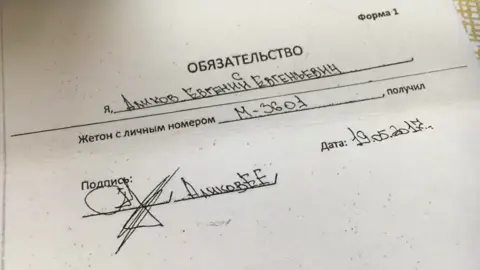
Yevgeny arrived in Syria last summer, on a passport given to him on 16 June. One of the documents his mother received after his death shows his identification number: M-3601.
The numbers given to soldiers by the defence ministry usually have a single letter of the Russian alphabet followed by a six-digit number. The numbers given to PMC fighters in Syria only have four.
Yevgeny sent his mother letters from Syria. "Mum, I'm off to the front," he wrote, adding that the sand was so bright, he couldn't walk around without sunglasses.
He was there for just two months. On 2 September he was killed near the town of Tiyas in Homs province. On the death certificate it says he died from "a gunshot wound to the abdominal cavity".
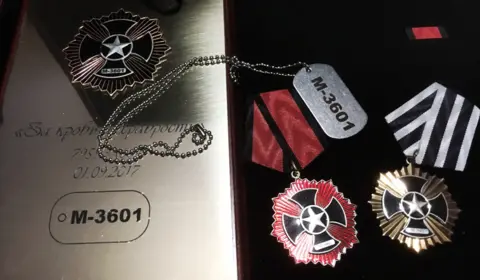
Nina was also given two medals from from the PMC known as Wagner, that employed her son. One for "heroism and valour" and the other for "blood and bravery".
She describes her son as a kind man and a good father: "Everyone cried when they brought him home."
The insurance money went into accounts for her grandchildren because she thought Yevgeny would have wanted that.
Last year the US government added PMC Wagner to its list of Russian individuals and entities subject to sanctions for involvement in the Ukraine conflict.
Read more on Russia's Syria campaign:
Soldier No 77
The documents which Nina received and gave to the BBC Russian Service show that at least 54 Russian citizens died in Syria in September 2017. This is more than the official number for the entire three-and-a-half years of Russia's Syrian campaign.
A Reuters investigation showed that in the first nine months of 2017, at least 131 Russians died in Syria. That investigation cites the death certificate of another fighter from a Russian PMC, Sergei Poddubny.
Poddubny died on 28 September in the same town where Yevgeny was killed: Tiyas. The death certificate, signed by Embassy Secretary Zaur Guseinov, says that he burned to death.
The Syrian Air Force has a base at Tiyas and there have been multiple reports of fighting in the area.
Poddubny's certificate is number 131. According to Russian justice ministry guidelines, death certificates are issued by embassies in numerical order, starting from zero at the beginning of each year.
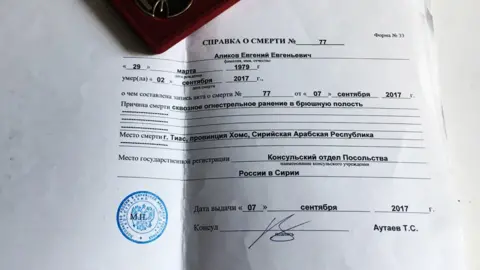
The death certificate of Yevgeny Alikov, killed on 2 September, is number 77. That means a Russian death toll in September of at least 54 (the difference between 77 and 131).
Russian consulates do not register the deaths of military personnel. A small number of Russian nationals - non-military - are based in Syria, but there have been no incidents to explain such a high number of civilian deaths.
According to the Russian defence ministry, only 44 official military personnel have died in Syria.
The Russian government recently acknowledged the deaths of "probably five" Russian volunteers for the first time, after a US air strike on 7 February.
Then on 20 February the government spoke of "dozens" of Russians killed or wounded in "a clash", stressing that they were not regular soldiers, and avoiding any details.
Struggle for recognition
On Nina's kitchen table is a heap of requests for information and official replies with blue seals. She now has one goal: to get the government to officially admit that her eldest son died for his country.
Her jaw trembles: "I want to ask this question: in what way are the children sent by the armed forces different from those like mine, who went as a volunteer?"
Despite the Kremlin's refusal to acknowledge her son's death, Nina has the support of local leaders. Joining her at the table is district councillor Galina Staritsyna.
"He's one of us. We are taking measures and providing support, this isn't even a matter of discussion," Ms Staritsyna explains.
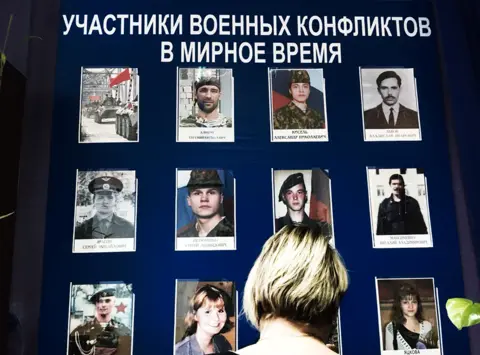
Yevgeny's picture now hangs in the local museum alongside images of townspeople killed in Chechnya and Afghanistan.
The town council also helped publish a short obituary in the local newspaper - on the final page, among the classifieds, next to an offer of free puppies.
Nina hopes the government will recognise not only the death of her son, but all PMC deaths in Syria.
"This isn't fair, after all. He didn't die in a brawl in an alleyway, but in battle," she says. "I want some sort of appreciation or gratitude for him from the government.
"I'm not asking for anything out of the ordinary. Or maybe he died for nothing? I don't know any more."
